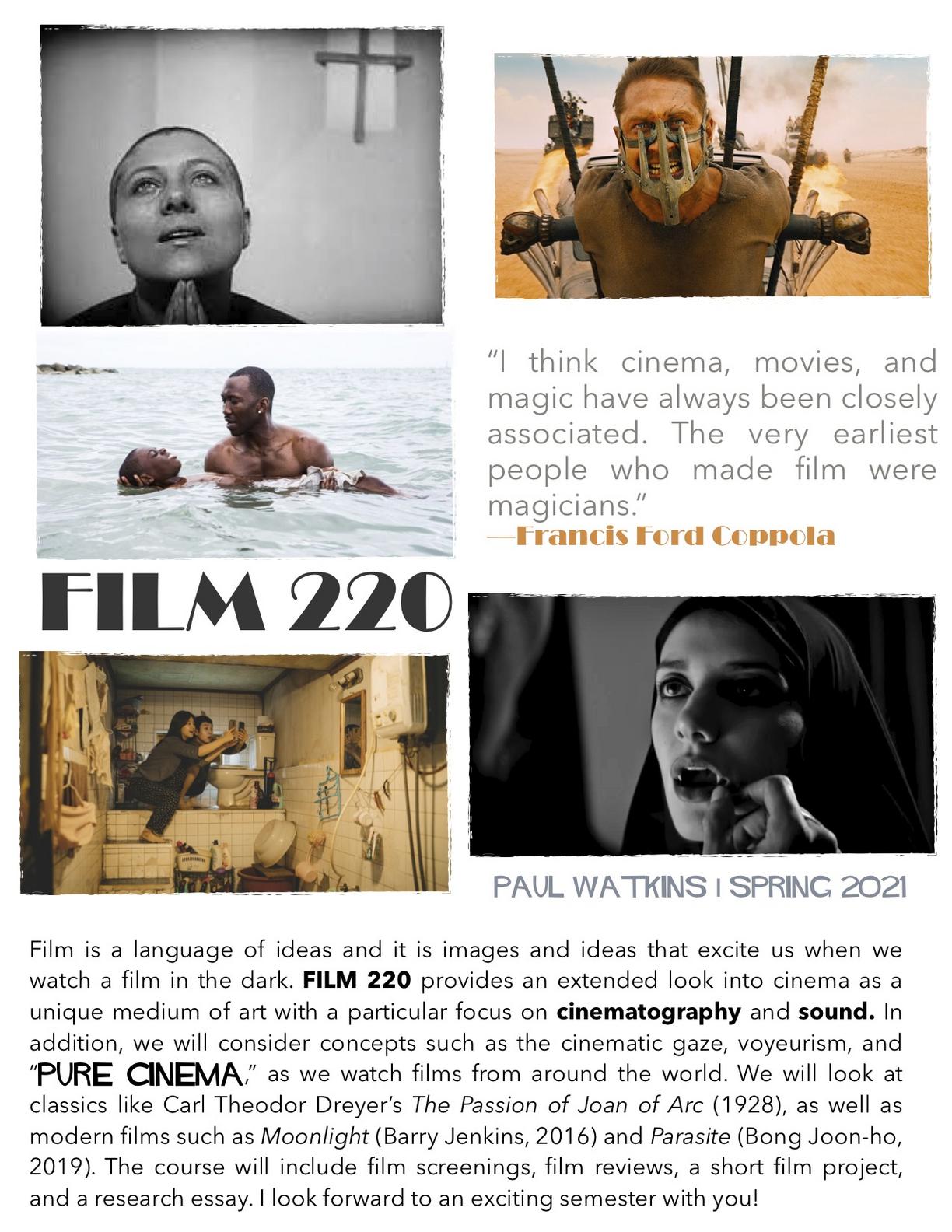Due to COVID-19, all English courses in the Fall (2020) will take place solely online. Please email specific professors with questions about course delivery.
FALL 2020
| Course Number | Course Description | Professor |
|---|---|---|
| 203 | Intermediate Academic Writing | Armstrong |
| 204 | Business and Technical Writing | Multiple Instructors |
| 208 | Introduction to Public Speaking | Multiple Instructors |
| 221 | North American Indigenous Literature | Gray |
| 231 | Speculative Literature | Burgoyne |
| 232 | Children's Literature | Klan |
| 240 | Ways of Reading | Torkko |
| 274 | Traditions and Transformations | Carpentier |
SPRING 2021
| Course Number | Course Description | Professor |
|---|---|---|
| 204 | Business and Technical Writing | Multiple Instructors |
| 208 | Introduction to Public Speaking | Multiple Instructors |
| 220 | Canadian Literature in Context | Thompson |
| 230 | Literature and Popular Culture | Wytenbroek |
| 233 | Literature and Film | Armstrong |
| 273 | Ancients and Moderns | Crover |
| 280 | Book Club | Moosa |
| 220 | Special Topics in Film Studies | Watkins |
Fall 2020 – Course Descriptions
ENGL 203: INTERMEDIATE ACADEMIC WRITING
Professor Clay Armstrong
An exploration of compositional technique through detailed attention to writing. The course makes use of distinctive themes and linked readings. Students write diverse short papers, discussing them in seminar and workshop formats.
ENGL 204: BUSINESS AND TECHNICAL WRITING
Multiple Sections

An introduction to business and technical communication skills with a focus on documents (such as letters and reports) and presentations. Topics may include planning, outlining, summarizing, presenting data, handling references, and editing. The course comprises several practical assignments, including a formal report and an oral presentation. ENGL 204 was formerly called ENGL 225; credit will not be granted for both courses.
ENGL 208: INTRODUCTION TO PUBLIC SPEAKING: COMMUNICATION
Multiple Sections
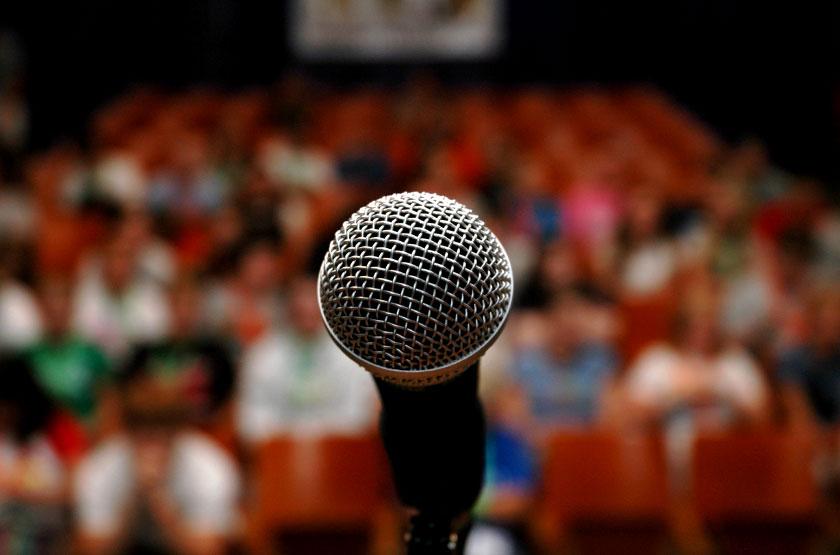
An introduction to public speaking that focuses on the creation, organization, and delivery of speeches for non-dramatic purposes. It provides the rhetorical principles of effective and ethical public speaking, offers opportunities to become familiar with different speaking situations, and attempts to instil a sense of the importance of public speech. ENGL 208 was formerly called THEA 203; credit will not be granted for both courses.
ENGL 221: NORTH AMERICAN INDIGENOUS LITERATURE
Professor Nelson Gray

This is an exciting time to be studying Indigenous literature. By bringing their lived experience to the fore in startling fresh ways, Indigenous authors are confronting and working through the abuses of colonization, affirming and re-imagining Indigenous identities, and telling compelling stories of courage, healing, and transformation. In so doing, they are providing a significant contribution to post-colonial and ecologically-informed ways of seeing and profoundly altering the consciousness of our time.
In English 221, we’ll be considering a range of poems, plays, and fiction by some outstanding Indigenous writers and enhancing our discussions with input from North American Indigenous Elders and with references to Indigenous film and music.
ENGL 231: SPECULATIVE LITERATURE
Professor Daniel Burgoyne
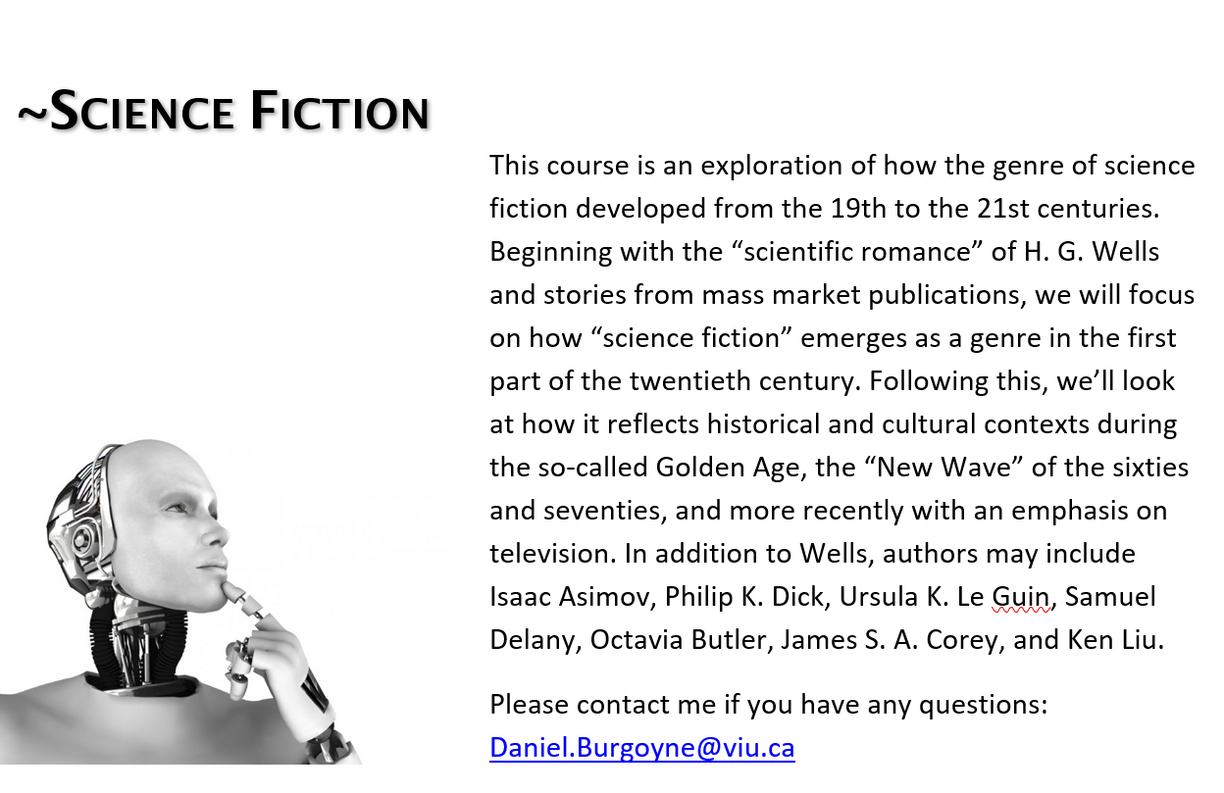
ENGL 232: CHILDREN'S LITERATURE
Professor Nicole Klan
“And what is wrong with playing with words? Words love to be played with, just like children or kittens do!” ―David Almond, My Name is Mina

Reading children’s literature is a way to revisit the fantasies, anxieties, and curiosities of our childhood imaginations. It’s a way to play with words, and, at the same time, question the ways that language intersects with politics, art, and ideology. This course will introduce students to a range of genres (the oral tradition, fantasy, realistic and historical fiction, picture books, and graphic novels) and a variety of authors and illustrators, both classic and contemporary. Topics may include, but are not limited to, histories of childhood and children’s literature, didacticism, censorship, gender and sexuality, race and culture, heroism and the agency of the child, and the child in nature.
Possible texts include Frances Hodgson Burnett’s The Secret Garden, David Almond’s Skellig, Maurice Sendak’s Where the Wild Things Are, Kimberly Brubaker Bradley’s The War that Saved my Life, Colin Meloy’s The Whiz Mob and the Grenadine Kid, Sara Pennypacker’s Pax, Michael Yahgulanaas’ Red: A Haida Manga, Mariko Tamaki’s This One Summer, and Cece Bell’s El Deafo.
ENGL 240: WAYS OF READING
Professor Deborah Torkko
Biography is an iceberg; a life is mostly submerged beyond our knowing. ― Anne Michaels
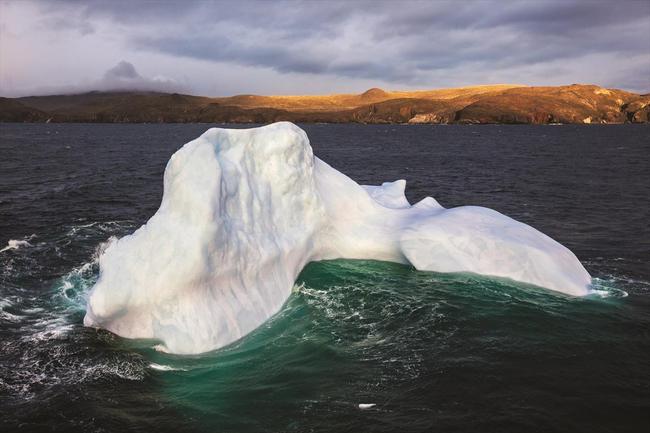
What kinds of truth can the biographical novel tell? Biography, like a novel, is a complex form of narrative art, and the biographical novel captivates the attention of many writers who through creative imagination and fictional techniques aim to depict the actual lives and lived circumstances of their subjects. Through meticulous research, fact-checking, selection, speculation, creativity, and editing the writer of biographical novels aims to shape a life into a coherent whole. Our readings will consider the social, historical, and fictional contexts from which biographical novels are written. We will examine the ties between conventional biography and fiction, between documentation and narrative construction, between the facts and the known limits of the subject’s life on the one hand and the creative speculations that fill in the gaps that life has created on the other. We will examine the relationship between writers and subjects, readers and texts, and consider why biographical novels invite us to look at life and literature in new ways. Possible texts may include Michael Ondaatje, Coming Through Slaughter; Penelope Fitzgerald, The Blue Flower; Michael Cunningham, The Hours; Kate Moses, Wintering; Paula McLain, The Paris Wife; Julian Barnes, The Noise of Time; Elise Hooper, Learning to See.
ENGL 274: TRADITIONS AND TRANSFORMATIONS
Professor Sally Carpentier
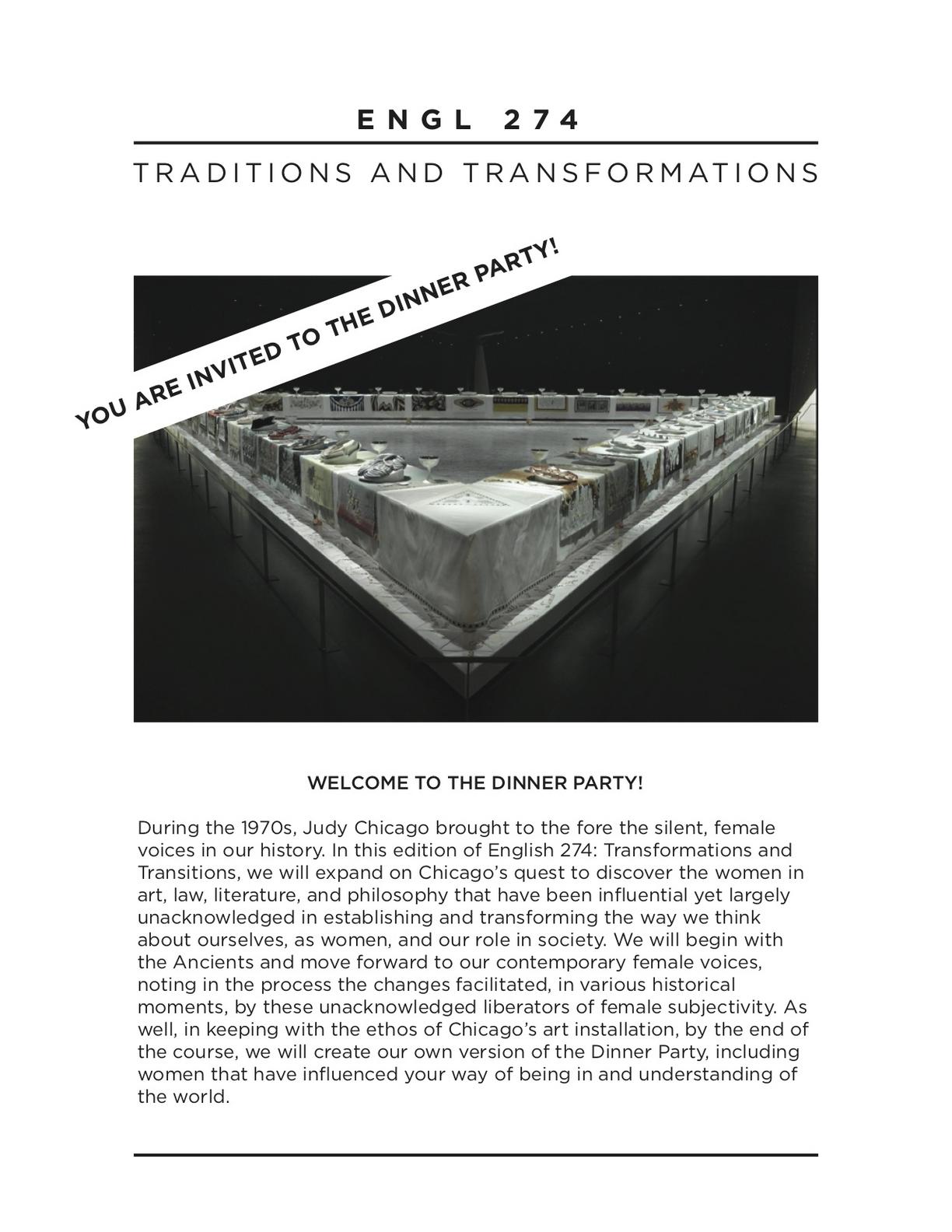
Spring 2021 – Course Descriptions
ENGL 204: BUSINESS AND TECHNICAL WRITING
Multiple sections

An introduction to business and technical communication skills with a focus on documents (such as letters and reports) and presentations. Topics may include planning, outlining, summarizing, presenting data, handling references, and editing. The course comprises several practical assignments, including a formal report and an oral presentation. ENGL 204 was formerly called ENGL 225; credit will not be granted for both courses.
ENGL 208: INTRODUCTION TO PUBLIC SPEAKING: COMMUNICATION
Multiple Sections
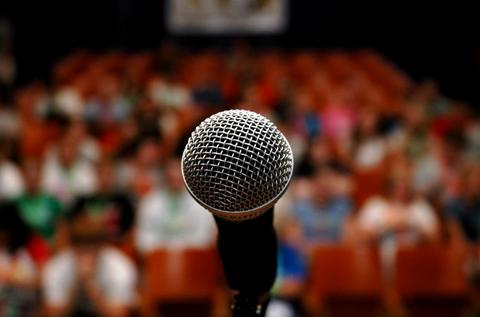
An introduction to public speaking that focuses on the creation, organization, and delivery of speeches for non-dramatic purposes. It provides the rhetorical principles of effective and ethical public speaking, offers opportunities to become familiar with different speaking situations, and attempts to instil a sense of the importance of public speech. ENGL 208 was formerly called THEA 203; credit will not be granted for both courses.
ENGL 220: CANADIAN LITERATURE IN CONTEXT
Professor Dawn Thompson
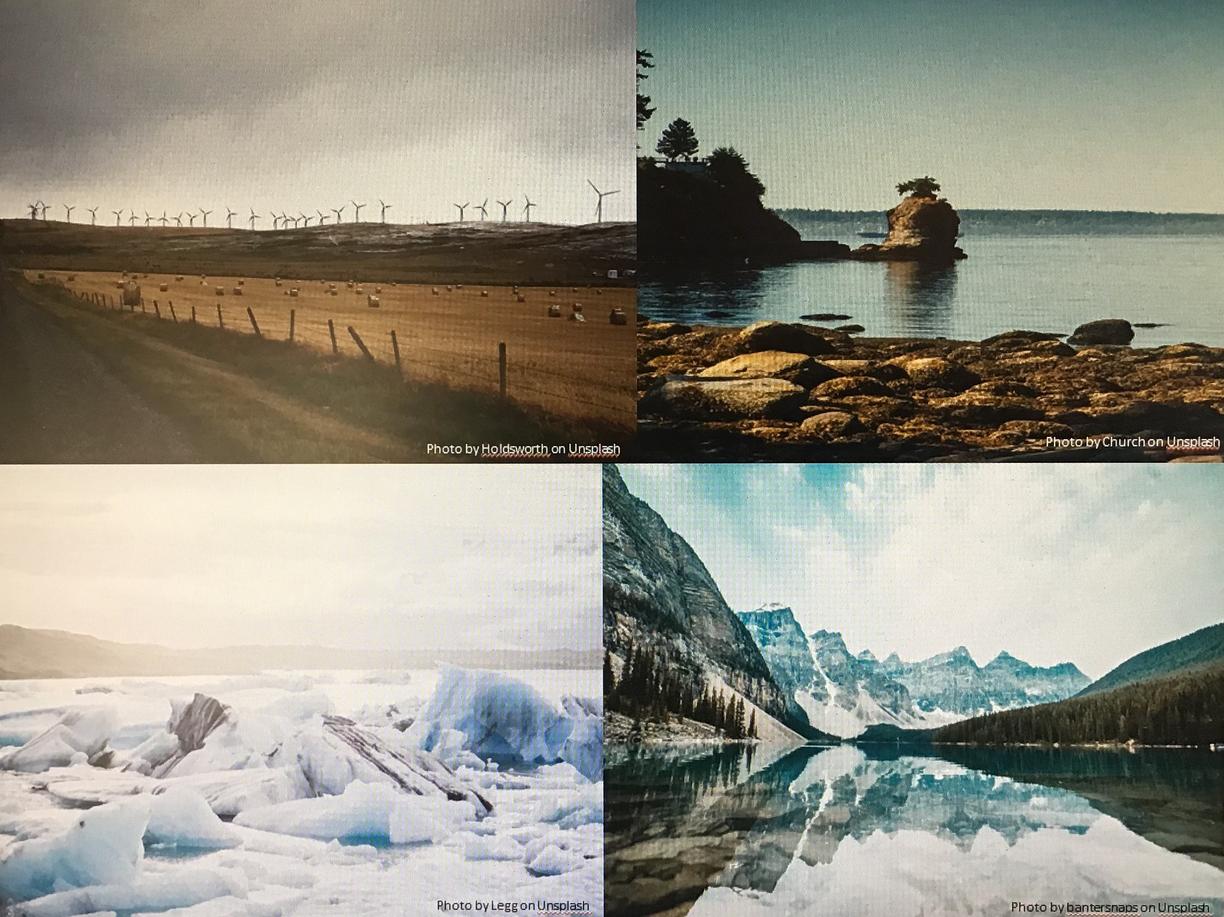
“These lands aren’t our lands. These lands aren’t your lands. We are this land.”
-Joy Harjo (Muscogee Creek Nation), “Bless This Land”
This land is arguably the primary context for all literatures in Canada, and at this particular point in time, many of our relationships to this land are fraught. Climate change, Indigenous land back movements, and protests regarding land use and resource extraction are compelling reasons to take a look at our diverse cultural contexts that shape those relationships and to learn more about, and from, each other. Readings in this course will balance Indigenous and settler works of literature, allowing us to consider different relationships to this land: Indigenous, English and French colonial, but also those of settlers from other colonized and colonizing nations; urban relationships; oral stories that come from the land itself; histories and histories of literature that reflect and shape our relationships, etc. Some of the texts we will read include Thomas King’s Green Grass, Running Water, Alistair McLeod’s No Great Mischief, Sky Lee’s Disappearing Moon Café, Cherie Dimaline’s Marrow Thieves, as well as selected poems and short stories.
ENGL 230: LITERATURE AND POPULAR CULTURE
Professor Lynn Wytenbroek
An examination of intersections between literature and popular culture, this course will focus on examples of popular literary works such as sensation and detective fiction, graphic narrative, and the Gothic. The course will explore representative works with some historical background.
ENGL 233: LITERATURE AND FILM
Professor Clay Armstrong
An interdisciplinary examination of literature and film. Topics may include relations between novels, comics, or scripts and cinematic adaptation; the comparative study of themes, national traditions, or theoretical concerns in both media; formal concerns and strategies; genres; or myth.
ENGL 273: ANCIENTS AND MODERNS: Dubious Heroes and Irresistible Villains
Professor Sarah Crover
What does it mean to be heroic? Can a woman be a ‘hero’ in the traditional sense? Can villains be noble or heroes despicable? What happens when your race or origin marks you as a potential monster in the eyes of the community that surrounds you? How has the definition of the heroic and the villainous shifted over time? This course will explore depictions of unlikely or dubious hero/ines and charismatic villains. That is, it will focus on texts that choose figures as heroes that for one reason or another – their gender, their race, their species, their morality etc. – unsettle received notions of what dominant culture has decreed ‘ought’ to make up a heroic or villainous figure.
As a class we will trace what it means, then and now, to be ‘bad’ or ‘good’ and how our unexamined cultural assumptions reveal the slippage in these seemingly categorically opposed character identities. Possible texts under consideration include Medea, Othello, Frankenstein, The Golden Compass, and Green Grass Running Water.
ENGL 280: BOOK CLUB
Professor Toni Smith
A Feast of Words: Food in Literature
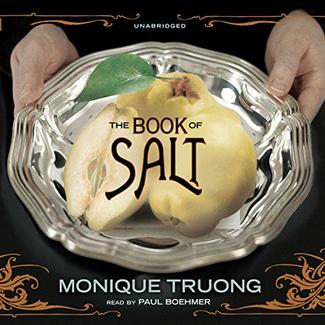
Food—as a central aspect of human life—has long preoccupied writers and readers, operating as a metaphor for consuming, for cultural belonging, and for relationships with the natural world. Eating as a bodily function has also made relationships with food a regular device for exploring relationships, gender, and the human body. And, of course, eating is a pleasure that leads to pleasurable reading and writing! Join us to read books that take us from the bustling food markets of Paris to colonial Vietnam; read family sagas of post-war China and the segregated US South, and delve into Canada’s complex culinary legacies.
Books may include: The Belly of Paris (Emile Zola), The Book of Salt (Monique Truong), The Joy Luck Club (Amy Tan), The Order of Good Cheer (Bill Gaston), Sassafras, Cypress, and Indigo (Ntozake Shange), and others.
FILM 220: SPECIAL TOPICS IN FILM STUDIES
Professor Paul Watkins
